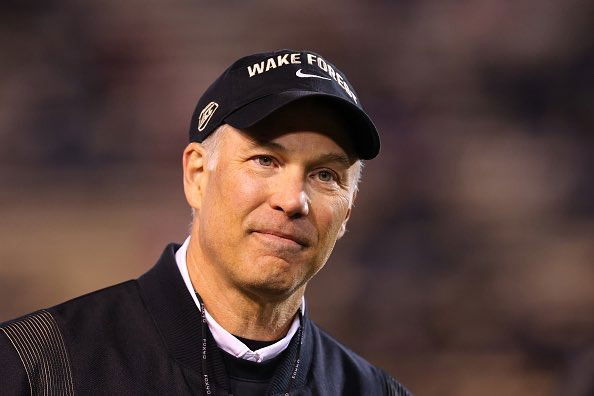

Eleven years is no small stretch of time. Imagine stepping away from something you’ve poured your heart, soul, and countless hours into—it’s a tough call. That’s exactly where Dave Clawson, Wake Forest’s head coach, found himself. But Clawson’s not completely walking away. On Monday, he announced his departure as head coach but revealed he’ll remain part of the Wake Forest family, transitioning into an advisory role within the athletic department.
The big question is why now, and what comes next for the Demon Deacons? Clawson has been a transformative figure for Wake Forest football. He didn’t just coach—he built something special. His tenure brought achievements many thought impossible, making him one of the most influential coaches in program history. Replacing a man of that caliber is no small task, which raises the question everyone’s asking: who’s stepping in to fill those shoes?
ADVERTISEMENT
Article continues below this ad
Who’s got the chops to fill Clawson’s shoes?
According to the New York Times, a few names are already in the mix. “Potential candidates to fill the Wake Forest job could include former West Virginia coach Neal Brown, James Madison head coach Bob Chesney, and Washington State head coach Jake Dickert, people briefed on the situation said.” But what makes these three stand out?
Neal Brown spent six years at West Virginia, finishing with a 37-35 record and two bowl game wins (the Liberty Bowl and Duke’s Mayo Bowl). Meanwhile, Bob Chesney, in his first season at James Madison, led the Dukes to an impressive 8–4 start and their second straight bowl appearance. And Jake Dickert has been at Washington State since 2021, where he’s posted a 15-16 FBS record. Well, each coach brings a track record of success, making them logical candidates to step into Clawson’s role. After all, they’ll inherit a program that Clawson himself turned into a competitive powerhouse.

When Clawson arrived in December 2013, Wake Forest was far from a football giant. Under his leadership, the program reached new heights: an Atlantic Division Championship in 2021, seven consecutive bowl berths from 2016 to 2022, and their first-ever top-10 national rankings in 2021 and 2022. His teams weren’t just great on the field; they earned national recognition for academic achievements as well.
What’s your perspective on:
Why would Dave Clawson leave after building such a successful legacy at Wake Forest?
Have an interesting take?
So, why step down now? Poor performance in back-to-back 4–8 seasons (2023 and 2024) seems to be the tipping point, but reports suggest the decision was entirely Clawson’s. “Coaching at Wake Forest has been the honor of my career,” Clawson said. “Together, we achieved things that many thought impossible, and I step down knowing I gave everything I had for this program and university.”
At 57, Clawson’s move to remain as an athletic advisor is both strategic and admirable. He’s stepping away on his terms—before facing mounting criticism or demands for his removal. Some might argue it’s unfair to judge his legacy on two tough seasons after years of unprecedented success. But as with all things in sports, results matter, and the truth is unavoidable.
ADVERTISEMENT
Article continues below this ad
Uncovering the truth about Dave Clawson’s resignation
Under Dave Clawson, Wake Forest has struggled to retain talent, partly because of purported NIL constraints that put the program at a financial disadvantage compared to its peers. As a result, Wake Forest finished 4-8 in each of the previous two seasons. And consequently, Wake Forest has faced some serious roster turnover in recent seasons. It’s not just guys jumping ship to other schools—they’ve lost some serious talent to the NFL too. They’ve got guys like QB Sam Hartman and RB Kenneth Walker III who’ve moved on to the pros over the years.
In spite of this, Dave Clawson’s vast legacy cannot be overlooked. While his overall record isn’t Hall of Fame worthy, Dave Clawson is a program builder. He turned things around at Wake Forest, a place where winning wasn’t always easy. His .493 winning percentage, the best in school history, falls short of the Hall of Fame’s .600 requirement. He is the only coach to win ten or more games in a season at four Division I schools.
ADVERTISEMENT
Article continues below this ad
Clawson’s resume is pretty impressive. He turned around Fordham, a struggling program, and even got them to the NCAA playoffs. He then led Richmond to a couple of postseason appearances. After a stint as offensive coordinator at Tennessee, he found success at Bowling Green, even winning the MAC. He then brought that winning mentality to Wake Forest. Now, he’s stepping into an advisory role. Let’s see how he continues to contribute to the Demon Deacons’ success.
ADVERTISEMENT
ADVERTISEMENT
ADVERTISEMENT
ADVERTISEMENT


Why would Dave Clawson leave after building such a successful legacy at Wake Forest?